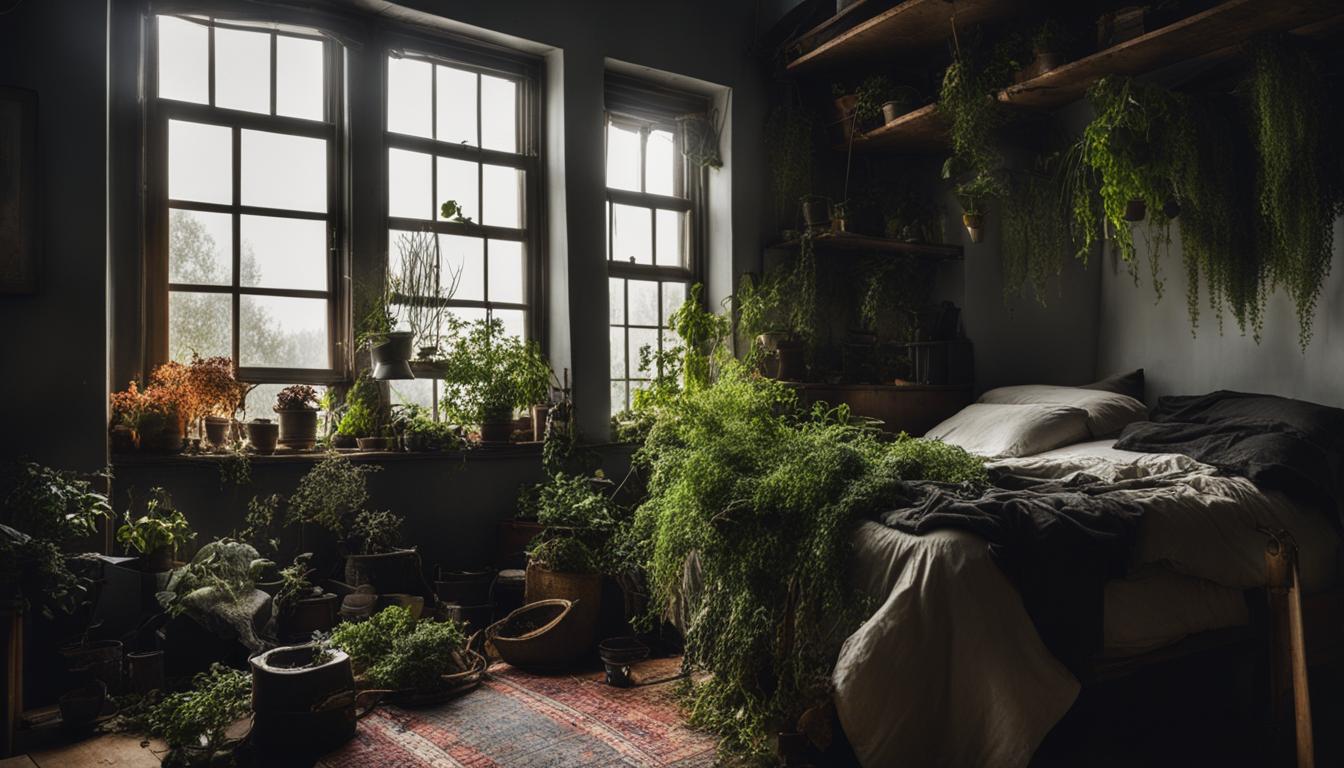Originally posted on October 28, 2023 @ 5:05 am
Have you ever wondered why plants are often not recommended in the bedroom according to the principles of Feng Shui? While plants are known to have numerous benefits for our overall well-being, some believe that they can negatively impact the energy balance of the bedroom. As a result, it is a common practice to avoid having plants in this particular space.
In this section, we will delve into the reasons behind the popular idea of not having plants in the bedroom according to Feng Shui principles. We will explore the potential negative effects of plants in the bedroom and provide recommendations for alternative ways to introduce natural elements into your bedroom while maintaining a harmonious energy flow.
So, why exactly are plants discouraged in the bedroom from a Feng Shui perspective?
Firstly, it is believed that plants can disrupt the energy flow in the bedroom. As plants are living organisms, they are said to emit strong, active energy that can disrupt the peaceful and calming energy required for a restful night’s sleep. Additionally, plants require a lot of care and attention, which can create a sense of distraction and even stress in the bedroom environment.
Moreover, some types of plants can also emit harmful toxins and fumes during the night, which can negatively impact air quality and lead to respiratory issues. This is why it is important to carefully consider which plants you choose to have in your bedroom or to avoid them altogether.
Key Takeaways:
- Feng Shui principles suggest not having plants in the bedroom due to their potential negative effects on energy flow and sleep quality.
- Plants are believed to emit strong, active energy that can disrupt the calming and restful energy required for the bedroom environment.
- Certain plants can also emit harmful toxins and fumes that can negatively impact air quality and lead to health issues.
The Energy of Plants in the Bedroom
According to Feng Shui principles, plants have the potential to affect the energy balance in your bedroom. While some people believe that having plants in your bedroom can bring positive energy and create a calming atmosphere, others argue that it can have negative effects on your sleep quality and well-being.
If you choose to have plants in your bedroom, it is important to consider the types of plants and their placement. Certain plants are believed to have specific benefits, such as improving air quality or promoting relaxation. However, some plants may also emit negative energy or disrupt the balance of the room.
To create a harmonious energy flow in your bedroom, consider these Feng Shui tips for incorporating plants:
- Choose plants with soft, rounded leaves, as they are believed to promote relaxation and calmness.
- Position plants at a distance from the bed, and avoid placing them directly in front of or behind you when you sleep.
- Avoid plants with thorns or spiky leaves, as they are believed to create negative energy.
- Consider using essential oils or natural materials, such as bamboo or wood, instead of live plants if you prefer not to have them in your bedroom.
If you prefer not to have plants in your bedroom, there are also potential benefits to consider. Without plants, your bedroom may have a simpler and more organized appearance, which can promote relaxation and tranquility. Additionally, without the upkeep and maintenance of plants, you may have more time and energy to focus on other aspects of your bedroom decor.
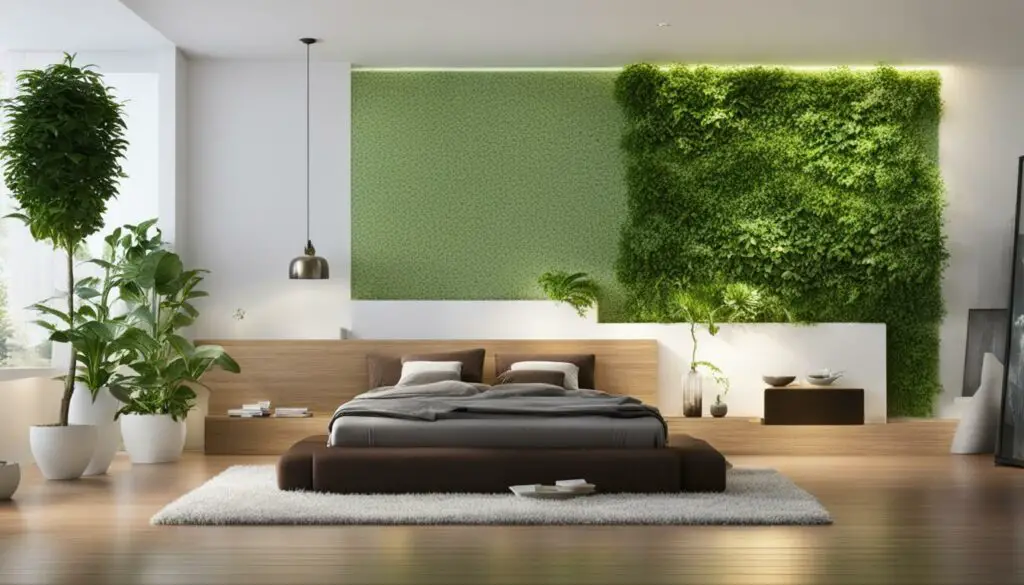
Ultimately, the decision to have plants in your bedroom comes down to personal preference and the energy flow and balance you wish to create in your space. By considering the potential benefits and drawbacks, as well as following Feng Shui tips for plant placement and selection, you can create a peaceful and harmonious atmosphere in your bedroom.
Negative Effects of Plants in the Bedroom
While plants bring life and energy to a space, according to Feng Shui principles, they can have negative effects on the energy of the bedroom. This is because plants, like humans, require energy to live and grow. This energy exchange can disrupt the natural flow of energy in the room, leading to potential imbalances and disturbances.
One of the main bedroom plants Feng Shui rules is to avoid having large plants or cacti in the bedroom. These plants are said to have too much energy, which can be overwhelming and disruptive to the tranquility of the space. Additionally, plants that produce strong scents, such as jasmine or lavender, may interfere with your sleep quality, even if they are beneficial for relaxation.
“One of the main bedroom plants Feng Shui rules is to avoid having large plants or cacti in the bedroom.”
Another factor to consider is the element of the plant itself. Plants are classified according to the five elements of Feng Shui: Water, Wood, Fire, Earth, and Metal. Each element corresponds to a specific energy and has unique effects on the energy of the space. Therefore, it is essential to choose plants that align with the specific needs of your bedroom and your personal energy.
Furthermore, clutter is a common cause of stagnant energy and can interfere with the natural flow of energy in the room. Having too many plants in the bedroom can contribute to clutter, leading to potential negative effects on the energy balance.
To maintain a harmonious energy flow in the bedroom, it is essential to follow bedroom plants Feng Shui rules, such as selecting small, peaceful plants with calming energy and locating them in areas that do not interfere with the natural traffic flow of the room.
Table: Potential Negative Effects of Plants in the Bedroom
| Effect | Description |
|---|---|
| Disrupts Energy Flow | Plants, like humans, require energy to live and grow, which can interfere with the natural energy flow of the room. |
| Causes Clutter | Too many plants in the bedroom can contribute to clutter, leading to potential negative effects on the energy balance. |
| Overwhelming Energy | Large plants or those with too much energy, like cacti, can be overwhelming and disruptive to the tranquility of the space. |
| Strong Scents | Plants that produce strong scents, such as jasmine or lavender, may interfere with your sleep quality, even if they are beneficial for relaxation. |
Plant Selection for Bedroom Feng Shui
If you still wish to have plants in your bedroom, it’s essential to choose the right ones that promote positive energy and create a calming environment. Here are some of the best feng shui plants for the bedroom:
| Plant | Benefits |
|---|---|
| Snake Plant | Improves air quality, absorbs toxins, promotes relaxation |
| Lavender | Calming scent, promotes relaxation and restful sleep |
| Jasmine | Calming scent, promotes relaxation and romance |
| Peace Lily | Purifies air, promotes relaxation |
| Bamboo Plant | Symbolizes strength and resilience, creates a sense of calm |
When selecting plants for your bedroom, it’s also essential to consider their placement. According to feng shui rules, avoid placing plants directly opposite the bed, as this creates conflicting energy. Instead, place them in areas that promote relaxation and tranquility, such as the corners of the room or on a high shelf.
Remember, less is more when it comes to incorporating plants in the bedroom. Stick to one or two carefully selected plants to avoid overwhelming the space. If you don’t have a green thumb or prefer a low-maintenance option, consider adding a small vase of fresh flowers or a natural touch such as a piece of driftwood or a small bowl of stones.

Enhancing Bedroom Energy with Feng Shui Plants
One of the primary benefits of incorporating Feng Shui plants into your bedroom is the enhancement of energy flow. The strategic placement of plants can promote a sense of calm and tranquility, encouraging a restful night’s sleep and improving overall well-being.
| Plant Type | Benefits |
|---|---|
| Snake Plant | This plant is excellent for improving air quality, making it an ideal choice for the bedroom. It is believed to absorb toxins and release oxygen, promoting a healthier sleeping environment. |
| Lavender | Lavender is known for its calming properties, making it a popular choice for enhancing relaxation in the bedroom. Its scent can help to reduce stress and anxiety, promoting a more peaceful sleep. |
| Jasmine | Another plant with a soothing scent, Jasmine is believed to promote a deeper and more restful sleep. Its fragrance can also help to reduce anxiety and improve overall mood. |
When selecting plants for your bedroom, it is essential to consider their individual properties and how they might affect the overall energy in the space. By choosing plants that align with your specific needs and goals, you can create a balanced and harmonious environment that promotes optimal health and well-being.
If you have limited space in your bedroom, you can still incorporate Feng Shui plants by hanging them from the ceiling or placing them on high shelves. This technique not only adds greenery to the space but also draws the eye upward, creating a sense of height and openness in the room.
Remember, the key to enhancing bedroom energy with Feng Shui plants is to be intentional and thoughtful in your choices. By taking the time to choose plants that align with your specific needs and arranging them in a way that promotes optimal energy flow, you can create a calming and restorative environment that supports your overall health and well-being.

Creating a Tranquil Bedroom Environment
When it comes to incorporating plants into your bedroom, it’s important to remember that personal preference plays a significant role in Feng Shui practices. While there are guidelines to follow, it’s essential to create a space that aligns with your individual taste and promotes a sense of comfort.
If you choose to have plants in your bedroom, consider the specific types that are believed to promote positive energy and create a soothing environment. Some of the best Feng Shui plants for the bedroom include:
| Plant | Benefits |
|---|---|
| Bamboo | Brings good luck and fortune |
| Lavender | Encourages relaxation and peacefulness |
| Jasmine | Promotes romance and restful sleep |
If you decide against having plants in your bedroom, there are alternative ways to introduce natural elements and promote positive energy. Natural materials, such as wood and stone, can create a calming and grounding effect. Additionally, artwork featuring landscapes or nature scenes can evoke feelings of tranquility. Essential oils, such as lavender or chamomile, can also promote relaxation and restful sleep.
Regardless of whether or not you choose to have plants in your bedroom, there are additional Feng Shui tips to consider for creating a tranquil environment. Some of these tips include:
- Using calming colors, such as blues and greens
- Ensuring adequate lighting, with the option for dimming at night
- Optimizing furniture placement for optimal energy flow
By taking these steps and considering the principles of Feng Shui, you can create a bedroom environment that promotes restful sleep, relaxation, and overall well-being.
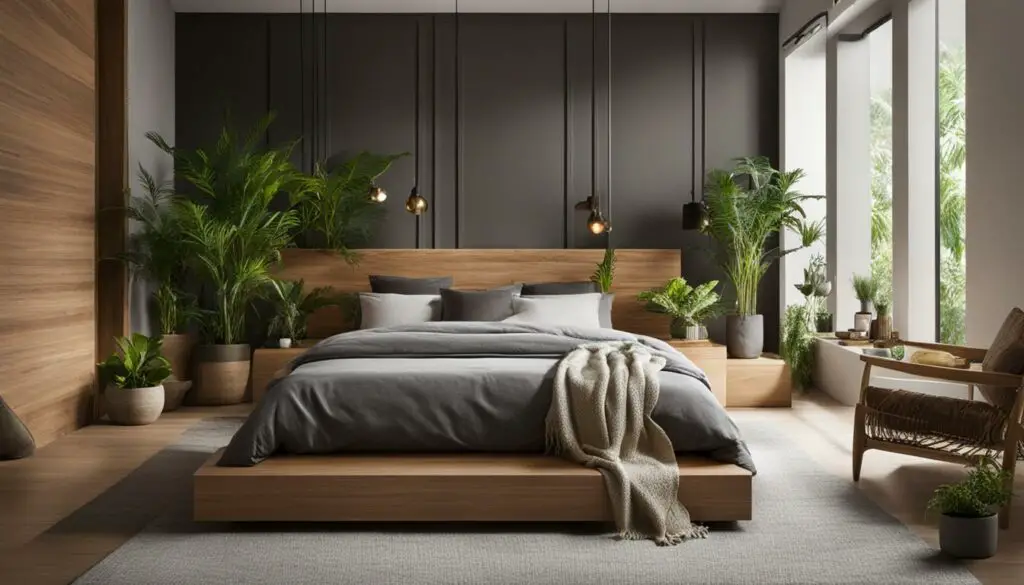
The Role of Plants in Feng Shui
Plants hold great significance in Feng Shui practices, as they represent growth, vitality, and the connection to nature. Incorporating plants into your home can help improve the energy flow and balance in your living space, promoting a sense of calm and harmony. However, when it comes to the bedroom, the principles of Feng Shui suggest that having plants can disrupt the restful energy needed for a good night’s sleep.
While it is generally advised to avoid plants in the bedroom, some practitioners believe that certain plants can have a positive impact on the space and its occupants. For example, the Snake Plant is believed to offer protective energy and improve air quality, making it a suitable choice for the bedroom. However, it is important to follow specific guidelines for plant placement in the bedroom to maintain the desired energy flow.
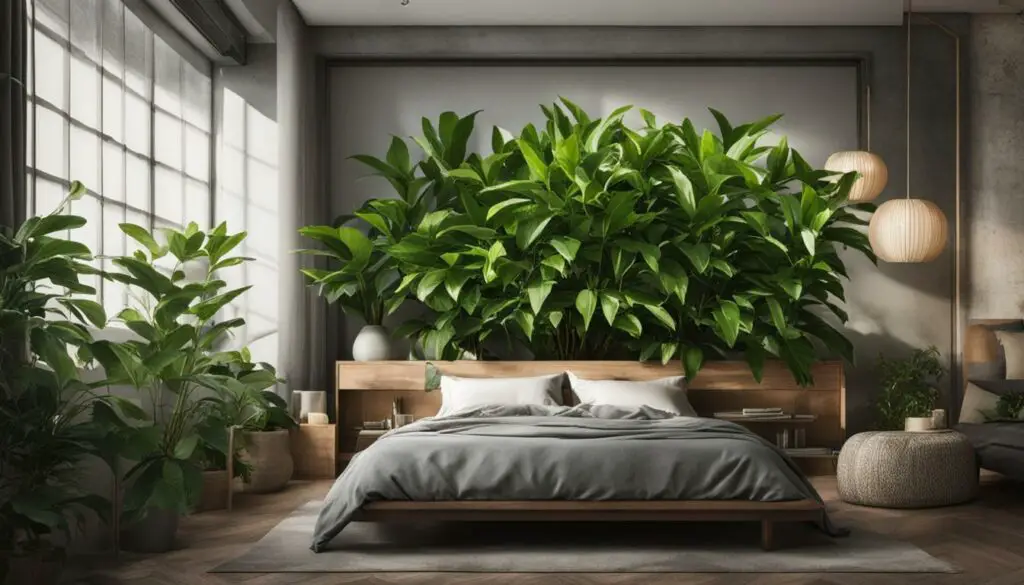
If you choose to incorporate plants into your bedroom, be mindful of the size and number of plants, as well as their placement. Large plants can create a heavy energy that may be disruptive to sleep, while an excess of small plants can create a scattered energy that lacks focus. Aim to place plants in the east, southeast, or south areas of the bedroom, as these are the sectors associated with growth and vitality.
Ultimately, the decision to have plants in the bedroom comes down to personal preference and the specific needs of the space. It is important to consider the energy flow and balance of the room, as well as any potential negative effects of plant placement, before making a final decision.
Alternatives to Bedroom Plants
While plants are a popular choice for adding natural elements to a bedroom, there are other ways to promote positive energy without them. Here are some alternative options to consider:
- Natural materials: Opt for natural materials in your bedding, curtains, and furniture to bring a sense of the outdoors into your space.
- Artwork: Incorporate nature-themed artwork into your bedroom to create a calming and peaceful atmosphere.
- Essential oils: Use essential oils such as lavender or eucalyptus to promote relaxation and improve sleep quality. Diffuse them in a diffuser or apply them topically.
- Crystals: Certain crystals are believed to promote positive energy and can be placed in your bedroom. For example, amethyst is said to promote restful sleep.
If you do choose to have plants in your bedroom, it’s important to select ones that align with Feng Shui principles. Here are some of the best plants for good Feng Shui in the bedroom:
| Plant | Description |
|---|---|
| Bamboo palm | Air-purifying and believed to bring luck and prosperity |
| Peace Lily | Air-purifying and believed to promote tranquility and harmony |
| Snake plant | Air-purifying and believed to bring protective energy and enhance concentration |
| English Ivy | Air-purifying and believed to reduce anxiety and promote peacefulness |

The Impact of Personal Preference
While there are guidelines to follow when it comes to incorporating plants in the bedroom according to Feng Shui principles, it’s important to remember that personal preference also plays a significant role in creating a comfortable and relaxing space.
Some individuals may find that having plants in the bedroom adds to the overall ambiance and enhances the energy flow, while others may prefer a more minimalist approach. It’s important to listen to your own needs and desires when it comes to designing your bedroom.
One way to strike a balance is by incorporating natural elements in other ways, such as through the use of wooden furniture or soft, organic textiles. Essential oils can also provide a natural and soothing scent without taking up physical space in the room.
Ultimately, the decision on whether to have plants in the bedroom comes down to personal preference. While there are potential benefits and drawbacks to consider, the most important aspect is creating a space that aligns with your individual taste and promotes a sense of calm and relaxation.
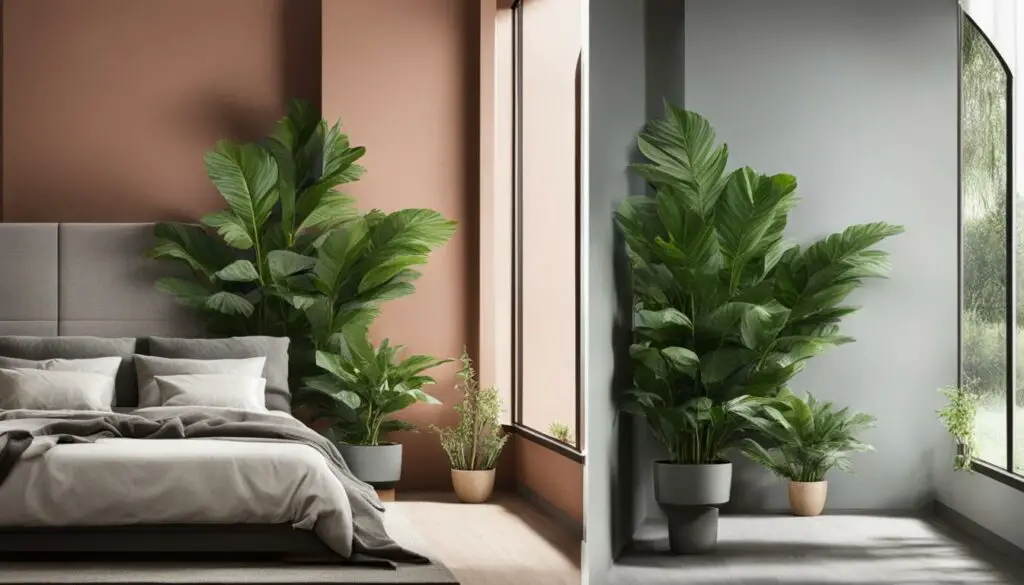
Maintaining Feng Shui Principles in the Bedroom
Whether or not you choose to have plants in your bedroom, there are several Feng Shui tips you can follow to maintain a harmonious energy flow in the space:
- Declutter regularly: Keeping the bedroom organized and free of clutter is essential to promoting positive energy. Avoid storing unnecessary items under the bed, as this can disrupt the flow of energy.
- Incorporate the five elements: The five elements of Feng Shui (wood, fire, earth, metal, and water) can be incorporated into the bedroom through color choices, materials, and decor. Ensuring a balance of these elements in the space can help create a serene atmosphere.
- Use appropriate lighting: Soft, warm lighting is ideal for the bedroom. Avoid harsh, fluorescent lighting that can create a disruptive energy.
- Choose appropriate furniture placement: The placement of furniture can also affect the flow of energy in the bedroom. Avoid placing the bed in direct alignment with the door or windows, as this can disrupt energy flow and cause restlessness.
- Follow plant placement guidelines: If you choose to have plants in your bedroom, ensure they are placed in appropriate areas according to Feng Shui guidelines. Avoid placing plants in the direct line of sight when lying in bed, as this can create a distraction and disrupt relaxation.
By following these tips, you can create a balanced and tranquil bedroom environment that promotes relaxation and positive energy flow.
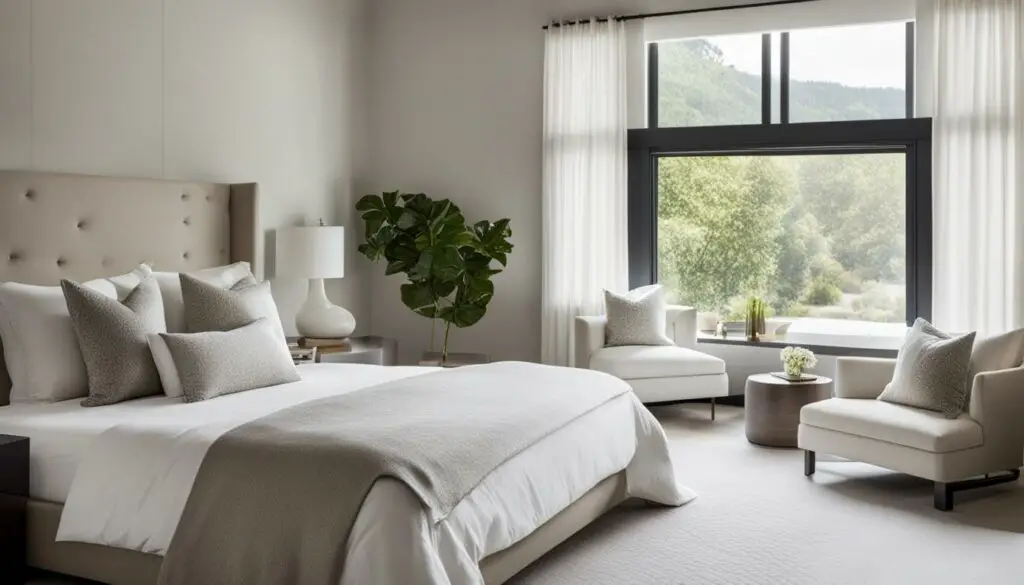
Harnessing the Power of Feng Shui in Your Bedroom
Now that we have explored the various aspects of Feng Shui in your bedroom, let’s summarize some key tips for creating a harmonious and balanced space:
- Declutter your bedroom. Remove any unnecessary items and keep only those that inspire joy and positivity.
- Choose soothing colors for your walls and bedding. Neutral shades, pastels, and earth tones are excellent choices for creating a serene atmosphere.
- Consider the placement of your furniture. Avoid placing your bed in line with the door, as this can disrupt the flow of energy. Instead, position it in a way that allows you to see the door but is not directly in line with it.
- Incorporate the five elements of Feng Shui – wood, earth, metal, fire, and water – into your bedroom. This can be done through the use of colors, materials, and decor items that represent each element.
- If you choose to have plants in your bedroom, follow the guidelines for plant placement and selection discussed in previous sections. Alternatively, you can incorporate other natural elements such as crystals or essential oils to promote positive energy.
- Make sure your bedroom is well-lit, with both natural and artificial lighting options. Avoid harsh overhead lighting and instead opt for soft, ambient lighting that promotes relaxation.
- Finally, trust your own instincts and personal preferences. While there are general guidelines to follow, the most important aspect of Feng Shui is creating a space that feels comfortable and aligned with your individual needs.
By incorporating these tips into your bedroom design, you can create a tranquil and rejuvenating space that promotes restful sleep and enhances your overall well-being. Whether you choose to incorporate plants or not, the principles of Feng Shui offer valuable insights into the energy flow and balance of your home.

Conclusion
While the practice of not having plants in the bedroom is based on the principles of Feng Shui, it ultimately comes down to personal preference. The potential benefits of improved sleep quality and enhanced relaxation can be achieved through other means such as decluttering and incorporating the five elements.
For those who still wish to have plants in their bedroom, it is important to consider the guidelines for plant placement and select plants that promote positive energy flow. However, it is also essential to maintain a balanced and clutter-free environment to ensure optimal energy flow.
Remember that creating a tranquil bedroom environment is about finding what works best for you and aligns with your individual taste. By harnessing the power of Feng Shui principles, you can achieve a space that promotes a sense of comfort and serenity.
FAQ
Why are plants not recommended in the bedroom according to Feng Shui?
According to Feng Shui principles, plants in the bedroom can disrupt the energy flow and create an imbalance. They are believed to bring too much yang energy into a space that should be more yin and calming, potentially affecting sleep and relaxation.
Can I have any plants in the bedroom?
While it is generally recommended to avoid plants in the bedroom, there are some exceptions. Certain plants, such as those with rounded leaves and gentle energy, may be more suitable for the bedroom environment. Examples include peace lilies, snake plants, and orchids. It is important to consider personal preferences and the specific energy of each plant.
What are the negative effects of having plants in the bedroom?
According to Feng Shui principles, having plants in the bedroom can create excessive yang energy, which can lead to restlessness, insomnia, and an over-stimulated mind. This can disrupt the balance and harmony of the space, potentially affecting overall well-being.
Are there alternatives to having plants in the bedroom?
If you prefer not to have plants in the bedroom, there are alternative ways to introduce natural elements and promote positive energy. Consider incorporating natural materials such as wood and stone, using artwork featuring nature scenes, or utilizing essential oils with calming scents like lavender or chamomile.
How can I enhance the energy in my bedroom without plants?
Even without plants, you can enhance the energy in your bedroom by following Feng Shui principles. Ensure proper organization and decluttering, incorporate the five elements (wood, fire, earth, metal, and water), and pay attention to lighting, color choices, and furniture placement. Creating a balanced and calming atmosphere is key.
What is the role of plants in Feng Shui?
In Feng Shui, plants serve various purposes in different spaces. They can help purify the air, symbolize growth and vitality, and represent the wood element. When used strategically, plants can promote positive energy and balance in a home or office setting.
Does personal preference play a role in Feng Shui practices?
Yes, while there are guidelines to consider, personal preference plays an important role in Feng Shui practices. It is essential to create a space that aligns with your individual taste and promotes a sense of comfort and tranquility. Trust your instincts and make choices that resonate with you.
How can I maintain Feng Shui principles in the bedroom?
To maintain a harmonious energy in the bedroom, regardless of having plants or not, consider decluttering regularly, incorporating the five elements throughout the space, and organizing furniture for optimal energy flow. Creating a serene environment can positively impact your well-being.
How can I harness the power of Feng Shui in my bedroom?
To harness the power of Feng Shui in your bedroom, it is important to understand the principles and concepts discussed. Take into account the energy flow, balance, and harmony of the space. By combining strategic plant placement, natural elements, and other Feng Shui tips, you can create a serene and balanced bedroom environment.
